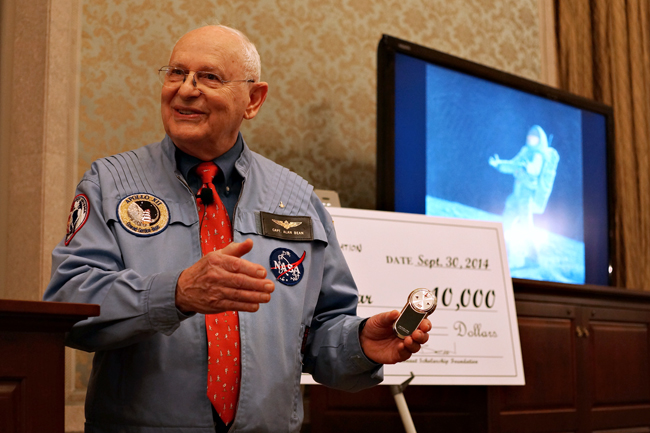Alan Bean, a former Apollo astronaut and UT alumnus, visited campus Tuesday to present a scholarship from the Astronaut Scholarship Foundation and talk about the knowledge he gained from being a NASA astronaut.
Sai Gourisankar, a Plan II and chemical engineering senior, was selected to receive the $10,000 scholarship. Gourisanker is focusing his collaborative research on nanotechnology for biomedical therapy and imaging used to detect and treat cancer.
Bean said Gourisankar should be proud of his research and individuality.
“It is amazing what this young man has accomplished,” Bean said. “We need people like you, Sai. We need these people for the future of this country and for the future of human beings on earth.”
Bean, who flew on the Apollo 12 mission, said he thinks it is important for people to pursue their dreams — despite opposition from others
“One of the things I’ve noticed in my life is it’s hard to hold onto your dream because your parents and other people don’t have the same dream, and they don’t necessarily see your dream as worthy,” Bean said. “You have got to hold on to what feels good to you.”
According to Bean, the ability to cooperate with others is necessary for someone who wants to be a good team member.
Beans said during his training he disagreed with a flight engineer’s approach to delivering information and questioned whether the engineer was a good team member because of it. A fellow astronaut, Charles Conrad, said he was too quick to pass judgement and made Bean realize that he might have been the bad team member for not appreciating everyone’s perspective.
Bean said if anyone wants to be influential in prompting a positive change, they should push to influence others through respect and good deeds every day.
“If you want to be a special person, you have to start thinking of ways to be special,” Bean said. “If we want to be special, we have to be proactive about it. People are waiting around for life to give us an opportunity to be special. … Forget it.”
In closing, Bean said people often fail to recognize their full potential.
“The only thing in the universe that we know of that’s not limited as to where it’s going to be in the future, are human beings — just like us,” Bean said. “We may be small on a cosmic scale, but we have been given this great gift of unlimited potential.”
Tammy Knowles, executive director of the Astronaut Scholarship Foundation, said Bean’s lecture gave her hope for future generations.
“I’m [now] even more hopeful for America and for the students that we have coming up that are going to find the cures that we need,” Knowles said. “Not only to take us to space and beyond … but also [for] all the other innovations that are going to come out … across the country.”




















